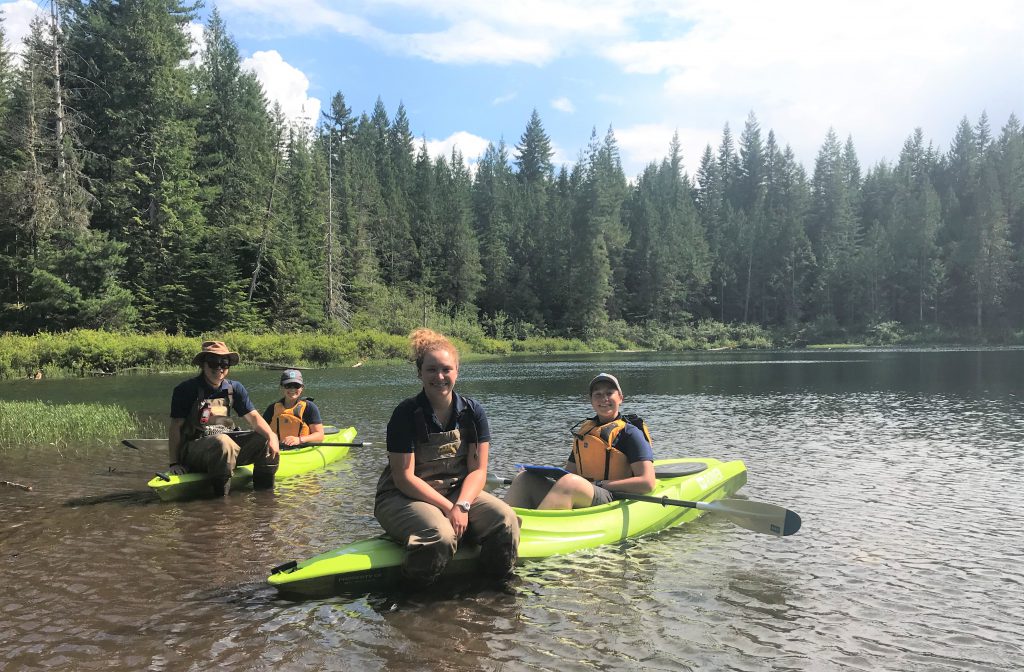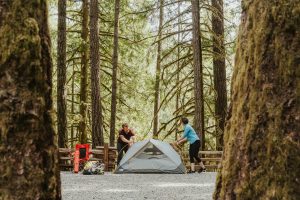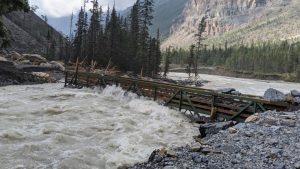Citizen Scientists Help BC Parks Monitor Western Toad Migrations
Categories:

On a calm morning in mid July, Rachel Shephard slides into a kayak and slowly starts paddling around the perimeter of Fawn Lake. Keeping a camera and notebook within reach, Shepard’s eyes are glued to the water, searching for any signs of western toad tadpoles.
“We’ve been looking to see where they are in the lake, doing rough counts and monitoring their development,” said Shephard, project coordinator for the Squamish Environment Society’s Western Toad Monitoring Project – a collaboration with BC Parks. “It’s really rewarding to be out in the field observing the toads, learning about toad ecology and contributing positively to their conservation.”
To learn more about the western toad populations that breed in Fawn and Edith Lakes at Alice Lake Provincial Park, Shephard and a team of 15 volunteer citizen scientists have been conducting surveys once or twice a week since breeding season began in early April. The goal is to gather data throughout the toad’s breeding cycle and pinpoint when they are close to migration, so BC Parks can mitigate potential impacts by notifying the public about toadlet routes and close portions of trails if necessary.
The western toad is found throughout B.C., western Alberta, parts of the Yukon and the Northwest Territories, but their numbers appear to be declining along B.C.’s south coast and Vancouver Island. The toad is now designated a federal species of special concern. Researchers believe loss of habitat and climate change have contributed to the population decline.
During spring, the adult toads migrate from terrestrial areas to communal breeding sites in wetlands, ponds and lakes. By mid summer, the tadpoles transform into toadlets and leave the water for the forest in large numbers, sometimes crossing busy trails, roads, campgrounds or day use areas where they can be trampled by humans.
BC Parks has identified problem areas for toadlet-human encounters throughout the province and has put successful mitigation measures in place at some parks. Boardwalks have been added to trails in Sasquatch and Inland Lake parks so toadlets can avoid being crushed. Kentucky-Alleyne Park near Merritt has a permanent wood fence directing toadlets safely to an underpass so they don’t have to go through the campground. Other parks, such as Alice Lake, are still searching for the best solution.
“When you have a really big migration, you can have a carpet of toads and it’s almost impossible to find a spot to step and avoid them,” said BC Parks Conservation Specialist Joanna Hirner, noting the migration typically lasts about a week. “One of the things we are trying to do with the Alice Lake project is identify certain corridors that are the most important for the toadlets, so we can maybe look at doing a toad tunnel under the trail.”
So far this summer, Shephard and her team have recorded thousands of tadpoles at Fawn Lake, but have yet to find any at Edith Lake, even though the group observed egg masses there in early May. Anecdotally, Shephard said migration numbers at Alice Lake have declined in recent years. She’s curious to see what unfolds during the next few weeks as the great toad migration begins.
“We’ve been preparing for this since April and it’s starting to happen now so it’s pretty exciting,” said Shephard, who’s learned a lot from the project. “There’s very little known about these particular breeding populations so we want to try and learn a bit more and see what we can do to help. The enthusiasm and dedication of the volunteers is fantastic.”
Monitoring of the western toad migration and other amphibian monitoring projects are supported by the BC Parks Licence Plate Program. So far, over 150,000 specialty licence plates have been sold, generating more than $4.1 million for programs and projects related to conservation, community engagement and Indigenous relations. To learn more about the BC Parks Licence Plate Program, visit http://www.env.gov.bc.ca/bcparks/licence-plates/




